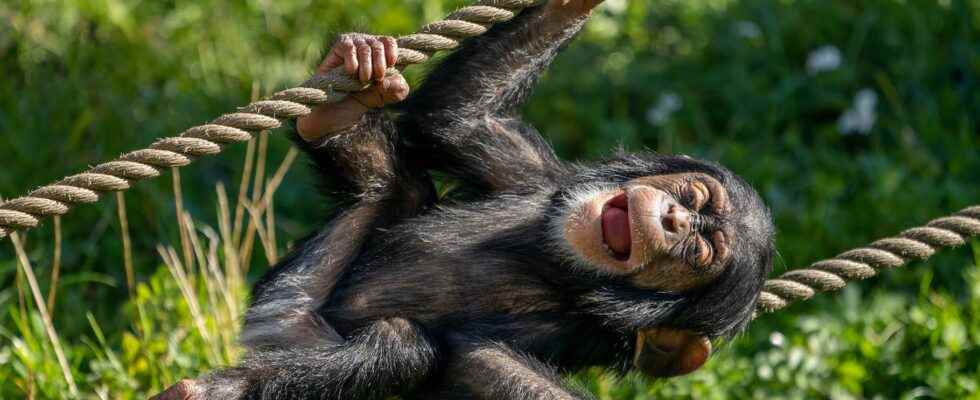“Beasts of science” is like a collection of stories. Beautiful stories that tell the living in all its freshness. But also in all its complexity. A parenthesis to marvel at the treasures of the world. For this new episode, let’s get in touch with our closest cousin: the chimpanzee.
You will also be interested
[EN VIDÉO] A chimpanzee rears up to bear fruit To be able to bear more fruit, a chimpanzee adopts bipedalism. Is this the origin of this mode of travel?
He lives in the forest. He walks on all fours. And he is furry. So many things that differentiate us from him. The chimpanzee. Even though he is, genetically speaking, the great ape closest to us. A cousin with which we share more than 98% of Genoa. That is to say.
However, it is difficult to imagine cousins with this wild animal who only knows how to express himself by uttering cries with primitive accents. Really ? Researchers aren’t so sure anymore. In 2018, they had already discovered that the chimpanzee – the one that lives in the Budongo forest, in Uganda, anyway – adapts its call according to the context. This monkey is even able to whisper “hoo”, intended exclusively for nearby companions. What to consider that behind these cries, which may seem a little boorish at first glance, there is a real intention. A chimpanzee who adapts his communication according to what he wants to express and his state of mind at the time.
So of course, on our Earth, there is only one animal species that can speak. This species is humans. Somewhere in the mists of time, we learned to associate sounds to form words. Then put these words together to build sentences. The monkeys, on the other hand, seem to have stuck to the use of simple cries. Unique sounds that they do not seek to associate to bring subtlety to their exchanges. Because that is where the complexity of human language comes from. Not from the diversity of sounds that we have invented. There are less than fifty different ones in each language. Non-human primates can use up to 40 of them. The complexity of our language was rather born from the way we know how to combine sounds and words, in a structured and hierarchical way. To obtain sentences that can express an infinity of things.
A complex and structured language
In the hope of better understanding how evolution has separated us from our cousin, researchers wanted to study in detail the structure and diversity of the vocal sequences produced by chimpanzees. To do this, they recorded for more than 900 hours, thousands of calls produced by the 46 members of three groups of these monkeys living in the wild in the Taï National Park, in Ivory Coast.
First, they identified 12 different types of calls. Grunts, gasps, screams or moans, for example. Which actually seem to mean different things depending on how they are emitted or even depending on the context. But it was the analysis that followed that proved most surprising. It shows that chimpanzees are able to combine up to ten types of calls, thus forming hundreds of different vocal sequences. A bit like our sentences, finally.
Thus the communication of chimpanzees turns out to be much more complex and structured than what ethologists imagined until now. Are they really using this opportunity to exchange rather sophisticated information? The researchers will have to evaluate it, during further studies, still in the months and the years to come.
Still, once again, an ability that we thought was the privilege of humans turns out to be accessible to other animals. Were they primates? History brings us down a little further from our pedestal. And shows that the chimpanzee is definitely not so stupid!
Interested in what you just read?
